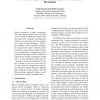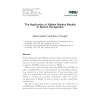367 search results - page 10 / 74 » Large-Vocabulary Speech Recognition Algorithms |
ACL
2007
15 years 12 days ago
2007
Speech recognition in many morphologically rich languages suffers from a very high out-of-vocabulary (OOV) ratio. Earlier work has shown that vocabulary decomposition methods can ...
103
click to vote
TASLP
2010
14 years 5 months ago
2010
Traditional n-gram language models are widely used in state-of-the-art large vocabulary speech recognition systems. This simple model suffers from some limitations, such as overfi...
ICMCS
2006
IEEE
15 years 5 months ago
2006
IEEE
In this paper the optimal filter-bank design method based on the Minimum Phone Error (MPE) criteria is investigated. We use Gaussian type filter bank for optimization and variou...
FTSIG
2007
14 years 11 months ago
2007
Hidden Markov Models (HMMs) provide a simple and effective framework for modelling time-varying spectral vector sequences. As a consequence, almost all present day large vocabula...
108
click to vote
NAACL
1994
15 years 8 days ago
1994
The key problem to be faced when building a HMM-based continuous speech recogniser is maintaining the balance between model complexity and available training data. For large vocab...


